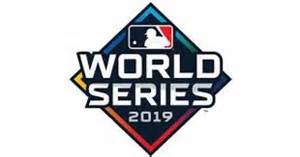World Series winners dig the long ball
By JERRY TAPP
Here are a couple of stats to pay attention to as this series between the Houston Astros and Washington Nationals plays out.
Home Runs. This year Major League teams hit more home runs than in any other season in baseball history. There’s little doubt that the long-ball plays an important part of today’s game. Washington had 231 home runs in 2019, sixth most in the National League and 13th most in all of baseball; the Astros, on the other hand, had 288 long balls, good enough for third most in the American League and third most in the majors.
Does the number of HRs a team hits in a game make a difference in whether a team wins or loses? In 2019, teams that hit three or more home runs in a game were 635-186, a .773 winning percentage.
Here’s a breakdown of how well MLB teams did when they hit zero, one, two, three, four, and five or more HRs in a game in 2019.
Zero HRs in a game: 360-960 .273
One HR in a game: 746-855 .466
Two HRs in a game: 688-428 .616
Three HRs in a game: 370-135 .733
Four HRs in a game: 164-38 .812
Five or more HRs in a game: 101-13 .886
Looking at World Series games since 2000, these numbers are not that different. Following are the same stats for home runs hit in a game in the World Series since 2000.
Zero HRs in a game: 36-49 .424
One HR in a game: 30-38 .441
Two HRs in a game: 25-15 .625
Three HRs in a game: 10-2 .833
Four HRs in a game: 4-2 .667
Five or more HRs in a game: 1-0 1.000
Starting Pitchers going six or more innings. We have seen a shift in baseball over the past several years where teams seem to focus on making sure their starter gets five innings and then it’s time for the bullpen to take over.
In the World Series since 2000, a starting pitcher has lasted six or more innings 110 times. His team has won 68 of those games and lost 42, a .618 winning percentage.
The trend, however, seems to show less dependence on the starter getting six innings or more. From 2000-2009, starters lasting six or more innings in the World Series happened 66 times with that starter’s team going 39-25 (.609) in those games. From 2010-18, starters lasting six innings or more in the World Series happened 46 times. Those teams did, however, won at a better clip, going 29-17 (.630).
BONUS STAT. This World Series is a matchup between the 107-win Astros and the 93-win Nationals. That’s a 14-win difference in the two teams. This is only the 10th time in World Series history that one team in the World Series had 14 or more regular season wins more than their World Series opponent. In fact, this is the second consecutive year this has happened; last year the 108-win Boston Red Sox defeated the 92-win L.A. Dodgers in the World Series. That 16-win difference was tied for the third-most in World Series history.
The biggest win difference in World Series history? In 1906, the 116-win Chicago Cubs faced off against cross-town rivals the Chicago White Sox, who had won 93 games, a 23-win differential. It’s important to note that the 93-win White Sox won that series. Of the nine previous times where a World Series matchup featured two teams that had a 14-win regular season differential, the team with fewer wins won three times. Most recent was in 2006 when the 83-win St. Louis Cardinals beat the 97-win Detroit Tigers to win the ’06 Fall Classic.
Follow Jerry on Twitter @StatsonTapp




